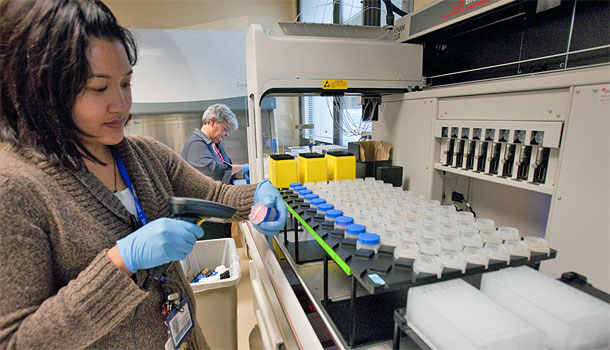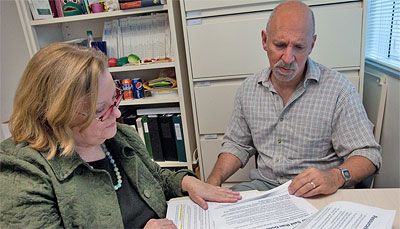
Spit in time may help save lives
Friday 2 December 2011
An ambitious project, teaming Kaiser Permanente and UCSF researchers, takes aim at genetic links to disease.
At last count, nearly 200,000 members of Kaiser Permanente, one of the nation's largest health maintenance organizations, had “spit for health” or given blood samples — providing a small supply of their DNA for researchers seeking genetic clues to the causes and prevention of many diseases.
The volunteers are part of the nation’s largest, most thorough effort to identify the genetic variations that underlie the aging process, vulnerability to disease and drug effectiveness.
The project goes well beyond the search for genetic links. It surveys patients’ personal habits, such as smoking, diet and availability of healthy food; it also examines environmental exposures, from pollution and pesticides to housing density and crime.
The research lays the groundwork for understanding how inherited traits and the environment affect health, and how genetic differences influence people’s responses to environmental insults and drug treatments.
Referred to as the Kaiser Permanente Research Program on Genes, Environment, and Health (RPGEH), it draws on Kaiser Permanente’s voluminous electronic patient medical records, which go back at least 15 years. It is the world's largest civilian electronic health record, and it is continuously updated to document the health status of all Kaiser members.

Catherine Schaefer and Neil Risch lead the Research Program on Genes, Environment and Health.
The RPGEH is led by Catherine Schaefer of Kaiser Permanente’s Division of Research and Neil Risch, director of UCSF’s Institute for Human Genetics.
The current phase of the RPGEH is funded by a $25 million grant from the National Institutes of Health. This support so far has enabled the researchers to develop genomic profiles of more than 100,000 RPGEH participants.
“Our goal is to provide a powerful resource for research into the genetic and environmental factors that may affect many common health conditions — such as cancer, cardiovascular disease, asthma, diabetes and mental health disorders,” said Schaefer, RPGEH's executive director.
“We expect this comprehensive approach will accelerate development of new ways to treat and possibly prevent these conditions,” she said.
With the exception of the military, Kaiser Permanente has the largest electronic record of patient medical history in the country, and genomic analysis now has advanced to the point that scientists can study the links between health data and individual genetic variation, Schaefer said.
The average age of Kaiser Permanente members who have volunteered to provide their DNA is 65 years old. The age of this cohort enables researchers to study a variety of conditions associated with advancing age, as well as healthy aging. However, the RPGEH hopes to increase participation among younger adults, including pregnant women, and will likely enroll infants following their births, so the average age of participants is likely to be younger in the future.
Current participants have been drawn from the diverse Northern California population, strengthening the project’s ability to search for possible differences among groups in genetic susceptibility to disease and to environmental factors that contribute to disease.
“The Kaiser population’s diversity gives our findings more power and greater ability to tease apart different disease vulnerabilities,” said UCSF’s Risch, who is co-principal investigator on the current NIH-funded collaborative grant with Kaiser Permanente.
“This is not only a genetics project; it’s genetics and epidemiology." he said. "The truth is that this project would have been impossible at any other time or place.”
The collaboration relies on powerful new commercial genotyping technology and the expertise of Kaiser Permanente and UCSF researchers to sift from this mother lode of data the minor DNA differences between people.
The target of the genomic tools are differences in single “letters” among the billions that make up the human genome. These differences — most called single nucleotide polymorphisms, or SNPS — can serve as unique genetic markers; some of them already have been linked to specific diseases or increased vulnerability to certain disorders.
Genes code for proteins which control nearly all activities in the body, and scientists expect that identifying telltale genetic signatures can highlight disease risk and lead to earlier diagnosis and treatment.
Genomic analysis was done at UCSF’s Institute for Human Genetics Genomic Core Facility under the direction of Pui-Yan Kwok.
One research project already under way will use the newly acquired genetic database to search for small genetic differences that might contribute to the relatively high incidence of prostate cancer among African American men.
Another study focuses on bipolar disorder. About 6,000 participants with the disorder will be enrolled as part of a separate study and compared with the 100,000 subjects already recruited, making it the largest genome-wide study yet of the disorder.
The NIH-funded research is also searching for links between SNP differences and the length of the tips of patients’ chromosomes, known as telomeres. These snippets of DNA are thought to be critical in cancer and other age-related disease. Telomere measurements on the large cohort were performed in the laboratory of UCSF scientist and Nobel laureate Elizabeth Blackburn, an expert on telomere biology.
Researchers also seek links between patients’ genomic profiles and their response to drugs. The fairly new field of pharmacogenetics aims to use these biochemical links to better tailor drugs to individual patients.
The Kaiser Permanente-UCSF research collaboration also involved a partnership with Affymetrix, Inc., which provided new technologies to rapidly analyze entire genomes; these now are being adopted by other scientists seeking to link genetic differences with disease.
Data from the enormous new genomics database will be available to researchers worldwide in 2012 through a Kaiser Permanente-developed online portal and through a federally supported database of genotype and phenotype data, to which the RPGEH will be contributing.